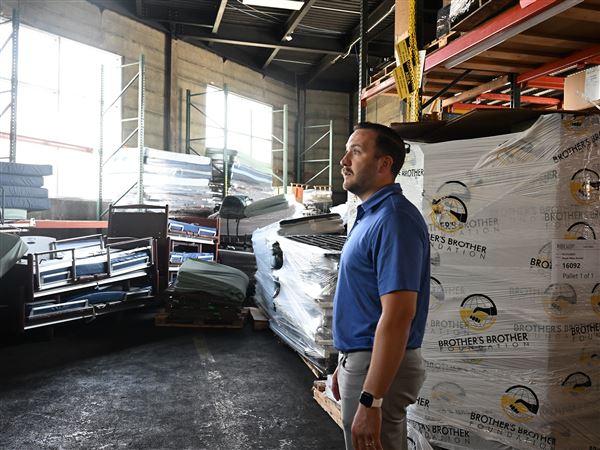This year's flu season already is showing its dangerous side, especially for relatively young and middle-aged adults who wouldn't normally seem to be vulnerable, according to local health experts.
In many years, influenza usually causes complications including hospitalization and death in young children and the elderly. But this year, a ferocious strain of the H1N1 influenza, or swine flu, virus has so damaged the lungs of four Allegheny General Hospital patients aged 35 to 65 that their blood must be circulated through heart-lung machines because their breathing no longer works properly, said Bob Moraca, a cardiothoracic surgeon at Allegheny General Hospital on the North Side.
In addition, five influenza patients have been placed on heart-lung machines at UPMC hospitals, including one person who died, said Donald M. Yealy, chairman of emergency medicine at UPMC.
That number of cases might be a bad sign of things to come, said Dr. Moraca, director of the heart-lung machine services at Allegheny General.
"The large number of patients early on requiring all this support is worrisome that we may see more," he said.
No pediatric patients have needed the machines at Children's Hospital of Pittsburgh of UPMC, a spokeswoman said.
The first such patient at a UPMC hospital was placed on a heart-lung machine, known officially as extra-corporeal membrane oxygenation or ECMO, about two weeks ago, Dr. Yealy said. Although an extremely invasive treatment, it sometimes is the only procedure that can save the patient's life, he said.
"It's the last thing before nothing else works," he said.
The flu season began in earnest approximately three weeks ago, in mid-December, and has escalated quickly, with 26 of this season's 44 lab-confirmed cases of influenza appearing in the week ending Dec. 28, in the most recent information reported by Pennsylvania and Allegheny County health officials.
Cases of influenza typically peak in late January or February, although flu viruses circulate widely into April.
Because of that, it's not too late for people who have not been vaccinated to get a flu shot, according to health experts, but the body typically takes 14 days to build a full immune response, so they should get immunized soon.
The four patients on heart-lung machines at Allegheny General were two men and two women who had not received flu shots and whose influenza infections were confirmed by a laboratory, Dr. Moraca said. Last year, a total of five flu patients were placed on the machines during the entire flu season, which typically lasts from September to April, he said.
In this year's cases, he said, the disease caused secondary viral pneumonia serious enough to damage their lungs, causing swelling and fluid buildup in the lung tissue and preventing the sufficient exchange of carbon dioxide and oxygen in the lungs. In such cases, he said, even a ventilator isn't enough support because the lungs aren't working properly.
Instead, the ECMO machines drain blood from the patient's lower extremities, remove carbon dioxide and add oxygen, then pipe the blood back into the person's upper body.
Two of the patients were only recently placed on the machines, and their prognosis is uncertain, Dr. Moraca said. The other two have been on the machines for a week and a half and seem to be improving. "They're making significant strides," he said. "The outcome looks promising."
First Published: January 7, 2014, 4:36 a.m.

















